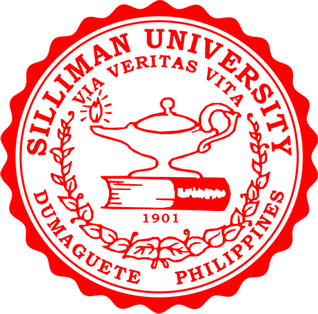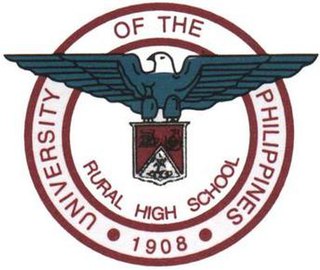Related Research Articles

The United States Public Health Service is a collection of agencies of the Department of Health and Human Services concerned with public health, containing nine out of the department's twelve operating divisions. The Assistant Secretary for Health oversees the PHS. The Public Health Service Commissioned Corps (PHSCC) is the federal uniformed service of the PHS, and is one of the eight uniformed services of the United States.

Ateneo de Manila University, commonly referred to as Ateneo de Manila or Ateneo, is a private, Catholic, teaching and research university, and a basic education institution located in Quezon City, Philippines. Established in 1859 by the Jesuits, it is among the oldest Jesuit-administered institutions of higher education in the Asia-Pacific.

The University of Santo Tomas, officially the Pontifical and Royal University of Santo Tomas, Manila or colloquially as Ustê, is a private Catholic research university in Manila, Philippines. Founded on April 28, 1611, by Spanish friar Miguel de Benavides, third Archbishop of Manila, it has the oldest extant university charter in Asia and is one of the world's largest Catholic universities in terms of enrollment found on one campus. It is the main campus of the University of Santo Tomas System that is run by the Order of Preachers.

Silliman University is a private, Protestant, and research university located in Dumaguete City, Philippines. Established in 1901 as Silliman Institute by the Presbyterian Board of Foreign Missions, it is the first American and Protestant founded institution of higher learning in the Philippines.

The University of the Philippines Manila is a public, coeducational, research university located in Ermita, Manila, Philippines. It is known for being the country's center of excellence in the health sciences, including health professional education, training, and research. It is the oldest of eight constituent universities of the University of the Philippines System, and predates the founding of UP by three years. It was originally established on December 1, 1905, as the Philippine Medical School and later renamed as the UP College of Medicine and Surgery on June 10, 1907. In 1983 it was renamed as University of the Philippines Manila.

The University of the Philippines Rural High School was established as a subsidiary of the Department of Agricultural Education of the University of the Philippines College of Agriculture, pursuant to Sec.4 of Act 3377 of the Philippine Legislature which was approved on December 3, 1927. The school, with a vocational curriculum, served as a practice school for the training of teachers, provided secondary education in agriculture for those preparing for college, and trained intermediate school graduates in agriculture.
Today, environmental problems in the Philippines include pollution, mining and logging, deforestation, threats to environmental activists, dynamite fishing, landslides, coastal erosion, biodiversity loss, extinction, global warming and climate change. Due to the paucity of extant documents, a complete history of land use in the archipelago remains unwritten. However, relevant data shows destructive land use increased significantly in the eighteenth century when Spanish colonialism enhanced its extraction of the archipelago's resources for the early modern global market. The Philippines is projected to be one of the most vulnerable countries to the impacts of climate change, which would exacerbate weather extremes. As the Philippines lies on the Pacific Ring of Fire, it is prone to natural disasters, like earthquakes, typhoons, and volcanic eruptions. In 2021, the Philippines ranked the fourth most affected country from "weather-related loss events", partly due to the close proximity of major infrastructure and residential areas to the coast and unreliable government support. One of the most devastating typhoons to hit the archipelago was Typhoon Haiyan, known locally as Yolanda, in 2013 that killed 6,300 people and left 28,689 injured. Congress passed the Clean Air Act of 1999, the Philippine Clean Water Act of 2004, the Climate Change Act of 2009 to address environmental issues. The country is also a signatory to the Paris Agreement. However, research has found that outside of cities, the general public doesn't feel equally informed. Environmental activists and land defenders, consisting mostly of Indigenous communities who have been attempting to bring attention to the environmental issues in the country have been met with violence or murder. As a result, the Philippines has been ranked one of the most dangerous places in the world for environmental activists. It also has one of the highest percentages of climate change denialists in the world.

The De La Salle Medical and Health Sciences Institute (DLSMHSI) is a medical school and allied health institution in Dasmariñas, Cavite, Philippines. It was established in 1979 and is a constituent of De La Salle Philippines. The institute consists of three service divisions: the academic division - consisting of the colleges and a senior high school, its teaching hospital - De La Salle University Medical Center, and a research facility - Angelo King Medical Research Center. It is situated nearby the De La Salle University-Dasmariñas, a separate De La Salle campus where it is often mistaken as part of due to its proximity.

The Department of Health is the executive department of the government of the Philippines responsible for ensuring access to basic public health services by all Filipinos through the provision of quality health care, the regulation of all health services and products. It is the government's over-all technical authority on health. It has its headquarters at the San Lazaro Compound, along Rizal Avenue in Manila.

The Mu Sigma Phi, or ΜΣΦ is the first fraternity in the University of the Philippines College of Medicine. It is also the first medical fraternity in the Asian region. The fraternity was first mentioned in the Philippine Collegian in its November 24, 1933 article as the "first and only medical students' fraternity." The Mu Sigma Phi does not confer honorary memberships.

Rodrigo Roa Duterte, also known as Digong, Rody, and by the initials DU30 and PRRD, is a Filipino lawyer and politician who served as the 16th president of the Philippines from 2016 to 2022. He is the chairperson of Partido Demokratiko Pilipino, the ruling political party in the Philippines during his presidency. Duterte is the first president of the Philippines to be from Mindanao, and is the oldest person to assume office, beginning his term at age 71.

Esperanza Alcantara Icasas-Cabral is a Filipina cardiologist and clinical pharmacologist. She served as Secretary of the Department of Health in the Philippines, taking office in January 2010 to replace Dr. Francisco Duque III after his appointment as chairperson of the Civil Service Commission. Before her appointment as Secretary of Health she was previously the Secretary of the Department of Social Welfare and Development, replacing Corazon Soliman. Dr. Cabral is married to Bienvenido Villegas Cabral, an ophthalmologist.

The Professional Regulation Commission is a three-man commission attached to Department of Labor and Employment (DOLE). Its mandate is to regulate and supervise the practice of the professionals who constitute the highly skilled manpower of the country. As the agency-in-charge of the professional sector, the PRC plays a strategic role in developing the corps of professionals for industry, commerce, governance, and the economy.

Francisco Tiongson Duque III is a Filipino physician and government official who served as Secretary of Health in the Cabinet of President Rodrigo Duterte from 2017 to 2022, a position he had previously held from 2005 to 2009 in the Cabinet of President Gloria Macapagal Arroyo. From 2010 to 2015, he served as the chair of the Civil Service Commission.

The University of the Philippines Manila College of Medicine (CM) is the medical school of the University of the Philippines Manila, the oldest constituent university of the University of the Philippines System. Its establishment in 1905 antedates the foundation of the UP System and makes it one of the oldest medical schools in the country. The Philippine General Hospital, the national university hospital, serves as its teaching hospital.

The University of Santo Tomas Faculty of Medicine and Surgery (USTFMS) is the medical school of the University of Santo Tomas, the oldest and largest Catholic university in Manila, Philippines.

Michael Lim Tan is a Filipino medical anthropologist, veterinarian, and writer who is currently a professor at the University of the Philippines Diliman College of Social Sciences and Philosophy. Tan served as the chancellor of UP Diliman from 2014 to 2020.

Far Eastern University, also referred to by its acronym FEU, is a private research non-sectarian university in Manila, Philippines. Created by the merger of Far Eastern College and the Institute of Accounts, Business and Finance, FEU became a university in 1934 during the term of its first president, Nicanor Reyes Sr.
The Dengvaxia controversy occurred in the Philippines when the dengue vaccine Dengvaxia was found to increase the risk of disease severity for some people who had received it.

Willie Tan Ong is a Filipino cardiologist, internist and media personality who rose to prominence for giving medical advice through his Facebook page and YouTube channel. Ong was also a candidate for the 2019 Philippine Senate election, largely capitalizing on his social media presence. He was a candidate for vice president in the 2022 Philippine presidential election as the running mate of former mayor of Manila Isko Moreno.
References
- ↑ "Gideon Lasco". histsci.fas.harvard.edu. Retrieved 31 October 2024.
- ↑ Research, Inquirer (15 December 2022). "Meet 'The Outstanding Young Men' of 2022". INQUIRER.net. Retrieved 31 October 2024.
- 1 2 Lasco, Gideon. "About Me". Gideon Lasco Personal Website. Retrieved 30 October 2024.
- ↑ "UP Manila congratulates Dr. Paul Gideon Lasco for being awarded as one of the 2022 Outstanding Young Scientists". UP Alumni Website. 19 July 2022. Retrieved 31 October 2024.
- ↑ Lasco, Gideon (6 October 2024). "How do ordinary people 'sense' water quality?". BusinessMirror. Retrieved 30 October 2024.
- ↑ Lasco, Gideon (2021). "Perceptions of Water Quality in the Philippines: A Sociocultural Perspective". Philippine Studies: Historical and Ethnographic Viewpoints. 69 (3): 321–345. doi:10.1353/phs.2021.0023.
- ↑ "Gideon Lasco on Drug Policy and Public Health". Rappler. Retrieved 31 October 2024.
- ↑ Zak, Daniel; Srey, Vutha (11 October 2024). "Speeding up the Economy: The Role of Methamphetamines in the Southeast Asian Boom". The Diplomat. Retrieved 30 October 2024.
- ↑ Lasco, Gideon; Oreña, Joyce (9 October 2023). "Gideon Lasco On The Happiness And Wellness Of The Mountain High". Vogue Philippines. Retrieved 30 October 2024.
- ↑ "Meet 'The Outstanding Young Men' of 2022". Philippine Daily Inquirer. Inquirer Research. 15 December 2022. Retrieved 30 October 2024.
- ↑ writers, Guardian; Quach, Georgina; Michaelson, Ruth; Ellis-Petersen, Hannah; Bhutto, Ali; McKernan, Bethan; Douglas, Ed; Fonbuena, Carmela (15 December 2021). "Books that explain the world: Guardian writers share their best nonfiction reads of the year". The Guardian. ISSN 0261-3077 . Retrieved 31 October 2024.
- ↑ De Vera, Ruel S. (12 October 2020). "In new book, Gideon Lasco ponders big questions of nationhood". Philippine Daily Inquirer. Retrieved 30 October 2024.
- ↑ "Gideon Lasco's Contributions to Public Health Discourse". Rappler. Retrieved 31 October 2024.
- ↑ Lasco, Gideon (2021). "Perceptions of Water Quality in the Philippines: A Sociocultural Perspective". Philippine Studies: Historical and Ethnographic Viewpoints. 69 (3): 321–345. doi:10.1353/phs.2021.0023.